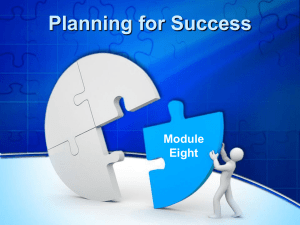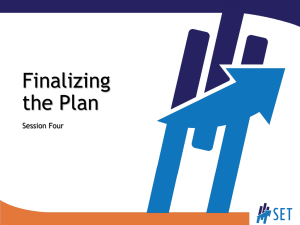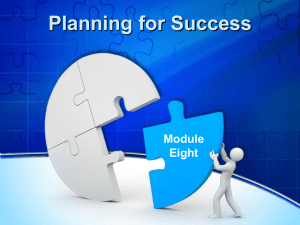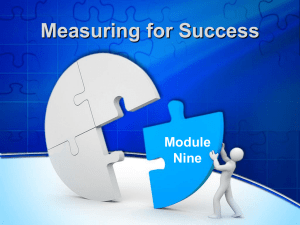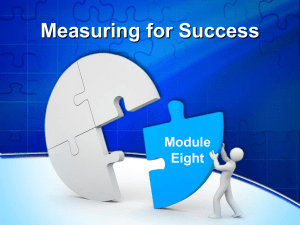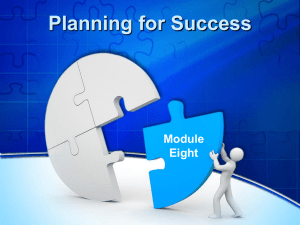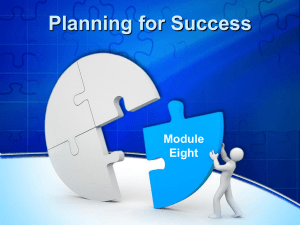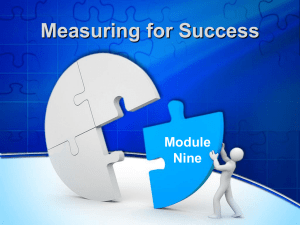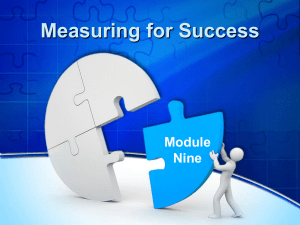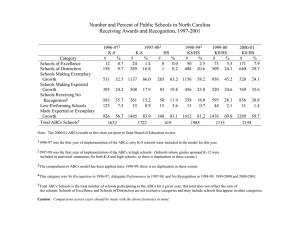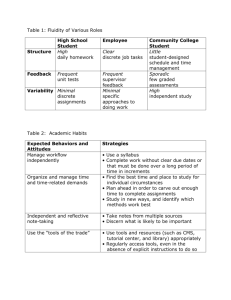Module Seven
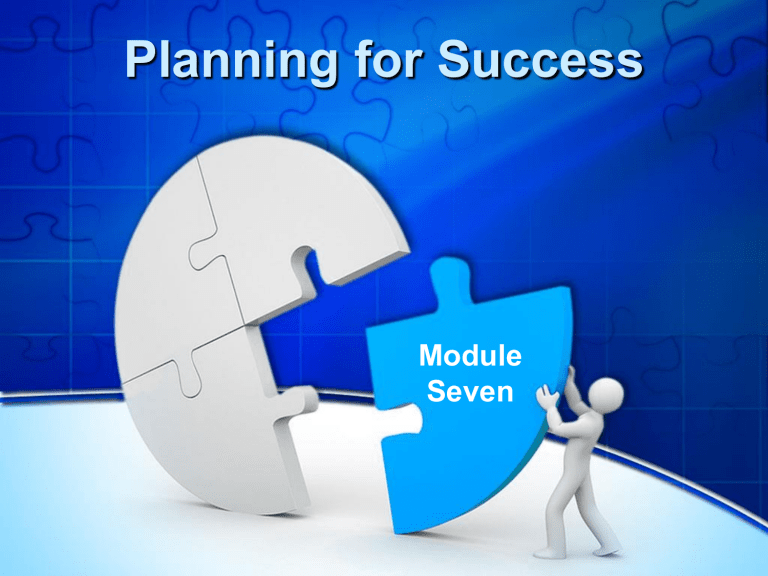
Planning for Success
Module
Seven
Producing a High Quality Plan:
The Essential Components
Evidence-
Based
Practical
Aligned with
Vision &
Goals
Team’s
Regional
Plan
Focused on
Regional
Economic
Development
Broadly
Supported
Reflecting on the Previous Session
• What was most useful from the previous session?
• What progress have you made since then?
• Any other comments or questions about that session?
Session Overview
• Identifying the ABCs of Success
• Selecting Strategies
• Planning for Action
• Deliverable : Identify strategies to support the regional goals
• HQP : Draft strategies, timelines, responsibilities, and a Plan of
Action
Identifying the ABCs of
Successful Planning
Making Changes that Matter
Do You Know Your ABCs?
A ttitudes,
Knowledge , and Skills
B ehavior C onditions
Success
Moving Forward:
Start with the End in Mind
Successful planning means thinking with the end product in mind.
Success
Condition
Conditions are the overarching changes you hope to see as a result of your efforts.
Changes in conditions take the longest to achieve.
Typically 5 years or more
Examples of Regional Conditions
• Reducing unemployment rate
• Reducing poverty rate
• Improving high school graduation rate
• Expanding number of profitable entrepreneurs
• Increasing number of jobs paying good, livable wages
• Increasing regional revenue generated from tourism
Your Plan:
Start with the End in Mind
Imagine five years from now….
• What do you hope is different in your region?
• What condition do you hope to change?
C onditions
Success
Behaviors
Behaviors are concrete actions that individuals or groups take. Conditions change as a result of changed behavior by individuals or groups.
These require doing something.
Typically 1-2 years
Moving from
B
to
C
B ehavior
• Individuals may need to work toward finishing high school
To:
• Businesses may need to develop Web sites
To:
• Government may need to expand support services to existing businesses
To:
C ondition
Increase graduation rates
Increase the number of successful small enterprises
Retain and expand existing businesses
Your Plan:
Go back to the condition you identified.
What behaviors need to change to reach that condition?
Who needs to make those changes?
B ehavior C onditions Success
Attitudes, Knowledge and Skills
Attitudes, knowledge and skills are elements individuals or groups can learn or develop in a rather short time.
These require
“brain power” or new learning.
Typically within the first 6-12 months
Moving from
A
to
B
A ttitude/Knowledge/Skill
• A person may need to value a high school diploma (attitude)
To:
• A business may need to learn how to create a Web site (skill)
To:
• Government may need to learn about concerns facing existing businesses
(knowledge)
To:
B ehavior
Work toward finishing high school (behavior)
Develop a Web presence
Expand appropriate support services
Your Plan
In order to get to the behaviors you want to change, what attitudes, skills or knowledge need to change?
A ttitudes,
Knowledge, and Skills
B ehavior C onditions
Success
Selecting Strategies
Strategies: What We Do
Our
Regional
Team
Does
Things
To/for/ with
People
• Workshops
• Counseling
• Technical Assist.
• Materials
• Clients
• Stakeholders
• Partners
• Businesses
ABCs
Strategies: Key Questions
Which ones will:
• Come closest to producing the desired outcomes (ABCs)?
• Appeal most to your target audience?
• Make the best uses of resources & assets?
• Help overcome key barriers?
• Be likely to spur the growth of the identified clusters?
Connecting the Pieces
Should Tell a Logical Story
Strategy
A ttitudes,
Knowledge, and Skills
B ehavior C onditions
Success
Example
Should Tell a Logical Story
Strategy
A ttitudes,
Knowledge, and Skills
B ehavior C onditions
Success
Web training
& tech assist .
Participants learn the value of website
Participants build website
Participants see increased revenue
Stronger
Small
Business
Base
Your Plan: Checking the Story
• Does your strategy match your ABCs?
• A logical story should move from your strategy, through your ABCs, to the success you anticipate.
Assets: The Engine
Individuals, organizations and resources you will need to implement your strategy
Your Plan: Assets
• Identify your assets:
What organizations are contributing?
What individuals are contributing?
• Are there missing pieces? If so, who can help with these?
Planning for Action
Developing a Plan of Action
Four Key Elements:
• Specific steps to be carried out
• Person who will take leadership for each step
• Realistic timetable for completion of each step
• Regular checkpoints to ensure progress & address barriers
Your Plan:
Gearing Up for Action
Homework
For each regional goal, complete a:
• Planning Chart
• Plan of Action
These will form the foundation for the final module, Measuring for Success.
Final Reflections
Takeaways from this module?
• What did you find most helpful?
• What did you find confusing?
• Other items?
Looking Ahead:
The final planning stage involves:
• Using Measures to Promote Success
• Tracking Appropriate Measures
• Creating a Regional Plan for
Measuring Success
